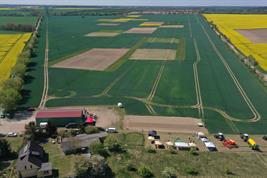05.06.2022
Press Release

Equipment manufacturers and scientific institutions presented digital tools and robotics for agriculture during the patchCROP Field Robotics Workshop on 3 May 2022. The event took place on the grounds of the patchCROP landscape laboratory in Tempelberg, Brandenburg, which is coordinated by the Leibniz Centre for Agricultural Landscape Research (ZALF).
Together with ZALF, the Leibniz Institute for Agricultural Engineering and Bioeconomy (ATB), the PhenoRob Cluster of Excellence and the DAKIS research project hosted the specialist event. In lectures, a panel discussion and technology demonstrations, scientists and manufacturers demonstrated the latest digital technology for agriculture.
In a keynote speech, Prof. Arno Ruckelshausen, Professor of Engineering and Computer Science at Osnabrück University of Applied Sciences, gave an overview of the range of digital agricultural technology available for practical use and possible development prospects. Prof. Anne-Katrin Mahlein from the Institute for Sugar Beet Research at the University of Göttingen presented digital solutions for crop protection in her keynote speech. In the BMEL-funded digital experimental field "FarmerSpace", coordinated by the University of Göttingen, research and practice partners are testing, among other things, drones and optical sensors for the detection of plant diseases as well as various agricultural robots for weed control.
Information systems and automation support sustainable agriculture
The subsequent lecture program gave partner projects of the "patchCROP" landscape laboratory the opportunity to present their work. Nahleen Lemke from ZALF explained how the DAKIS project (Digital Knowledge and Information System for Agriculture) can help farms to use techniques such as artificial intelligence and robotics to manage resources more efficiently and in a way that is adapted to the landscape and the demands of society. Prof. Chris McCool, Department of Agricultural Robotics and Engineering at the University of Bonn, illustrated the progress of the research of the "PhenoRob" Cluster of Excellence on robotics and autonomous systems, for example for mechanical and sustainable crop protection. Helge Wanta from the Technical University of Dresden presented an extension of the computer game "Farming Simulator 2022", in which the research design of the "patchCROP" landscape laboratory can be depicted and the research content developed in a playful way. In the future, the virtual demonstrator will help to make the interactions of small-scale farming tangible with the help of robotics and new technologies for soil processes, yield and other factors such as biodiversity.
Focus on practice and applicability
In the subsequent panel discussion, journalist Andreas Oppermann debated with researchers Prof. Cornelia Weltzien (ATB) and Dr. Maria Kernecker (ZALF) as well as Prof. Engel Arkenau, the Digitalization Officer of the Federal Ministry of Food and Agriculture (BMEL), the question of what steps are necessary for agricultural robotics to become part of everyday operations on farms. In addition to questions of approval, safety and liability, the experts also discussed the importance of independent advice and information for farms. Another important point of discussion was the question of the economic efficiency of the new technology: Will the purchase also pay off for smaller farms? The panel was unanimous on the point that the expertise and decision-making autonomy of farmers will continue to be central to agricultural processes in the future. Digital tools should only take on the role of a support system for agriculture.
Companies and research present digital helpers
Following the lecture program, the manufacturers Zauberzeug and Naïo presented various agricultural robots that can be used primarily for weed control in special crops such as herbs, vegetables and sugar beet. The team from the Leibniz Institute of Agricultural Engineering and Bioeconomy (ATB) demonstrated the autonomously driven small tractor SunBot for use in the cultivation of bush berries. Representatives of Bayer presented the digital yellow trap, which digitalizes and simplifies pest monitoring in oilseed rape. In addition, the companies AgXeed, geo-konzept, E-Terry and the digital experimental field LANDNETZ presented their offerings in the areas of software, surveying, precision farming, robotics and data infrastructure.
Modern technology is tested in the landscape laboratory
The research design of the "patchCROP" landscape laboratory, the partner institutions of which had invited to the workshop, relies heavily on the support of digital tools and agricultural robotics. Here, small-scale, climate-resistant and sustainable agriculture adapted to heterogeneity is tested as a model: The field is divided into small field units of only about half a hectare. Up to nine arable crops grow side by side here on the field. However, these so-called patches cannot be cultivated using large heavy agricultural machinery. Starting this year, the research team and their practice partner, the Komturei Lietzen, have been using a maneuverable small agricultural robot from the company Naïo for cultivation, for example for weed control. Soil sensors or drones record the condition of soil and plants.
Project Partners:
 Press release as PDF file
Press release as PDF file
Further Information:
For downloading the pictures please click on a picture and use the icon.

